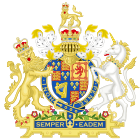Treason Act 1702 facts for kids
| Act of Parliament | |

|
|
| Long title | An Act for enlarging the Time for taking the Oath of Abjuration; and also for re-capacitating and indemnifying such Persons as have not taken the same by the Time limited, and shall take the same by a Time to be appointed; and for the further Security of Her Majesty's Person, and the Succession of the Crown in the Protestant Line; and for extinguishing the Hopes of the pretended Prince of Wales, and all other Pretenders, and their open and secret Abettors. |
|---|---|
| Citation | 1 Ann. St. 2. c. 21 (Ruffhead c. 17) |
| Territorial extent | Kingdom of England (inc. Wales); extended to Scotland in 1708 |
| Dates | |
| Royal assent | 27 February 1703 |
|
Status: Current legislation
|
|
| Revised text of statute as amended | |
The Treason Act 1702 was an important law passed in England a long time ago, in 1702. Its main goal was to protect who would become the next king or queen of England. This law made sure that the rules for who inherits the throne, which were set by earlier laws like the Bill of Rights 1689 and the Act of Settlement 1701, were followed.
Contents
Protecting the Royal Family's Succession
This law made it a very serious crime, called treason, to try and stop the person who was next in line to the throne from becoming the ruler. It was designed to keep the royal family's succession clear and safe.
What is Treason?
The Act specifically said it was treason to "endeavour to deprive or hinder any person who shall be the next in succession to the crown... from succeeding". This means trying to stop the rightful heir from taking the throne.
Changes to the Penalty
When the law was first made, the punishment for this crime was the death penalty. However, in 1998, the punishment was changed. Now, if someone is found guilty of this type of treason, they will face life imprisonment instead.
Where the Law Applied
Even though the law was first passed by the Parliament of England, it later became important for Scotland too. This happened after England and Scotland joined together in 1707. The law was extended to Scotland in 1708 by the Treason Act 1708.
The Parliament of Ireland also passed a similar law in 1703. This Irish version, called the Treason Act (Ireland) 1703, is still in effect in Northern Ireland today.
The Treason Act in Movies
This old law has even appeared in some movies!
King Ralph
In the movie King Ralph, the main character, Ralph, uses the Treason Act of 1702. He uses it to order the arrest of Lord Graves. Ralph believes Lord Graves tried to stop him from becoming king. Interestingly, Ralph incorrectly says the law was passed by King William III. It was actually passed during the first year of Queen Anne's reign.
Johnny English
The Treason Act also shows up in the movie Johnny English. The villain, Pascal Sauvage, is put on trial for treason under this Act. His plan was to take over the throne. In the movie, it's said that the crime still carries the death penalty. However, this movie came out in 2003. By then, the punishment for this specific treason had already been changed to life imprisonment in 1998. So, the movie's detail about the death penalty was not accurate.
See also
- High treason in the United Kingdom
- Succession to the Crown Act 1707
- Treason Act
 | Misty Copeland |
 | Raven Wilkinson |
 | Debra Austin |
 | Aesha Ash |

